A tale of two gun ranges in the US Midwest
- Published
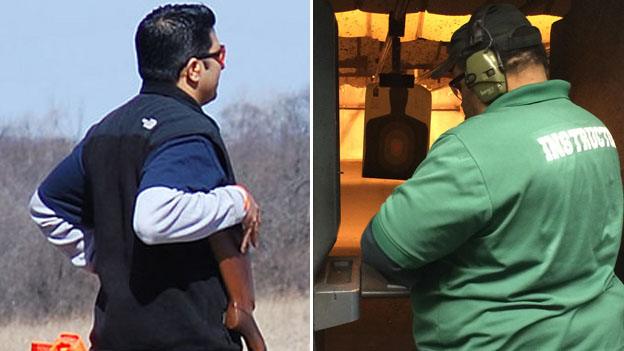
In a small, indoor hall adjacent to a firearms store in Posen, Illinois, Gerald Vernon puts a small group through their "concealed carry" paces.
Gerald, a bulky man in a green polo shirt emblazoned with the word "Instructor" is a relatively rare creature - a long-time African American member of the National Rifle Association.
He teaches people from Chicago's South Side how to take advantage of their recently-won right to carry and use concealed weapons.
At the beginning of the year, Illinois became the 50th American state to allow its citizens to do this, and people are queuing up for Gerald's tutorials.
His lessons combine target practice (to get a concealed carry licence, you have to pass a practical test) with sober tips on how to cope with the practical, psychological and legal consequences of pulling the trigger.
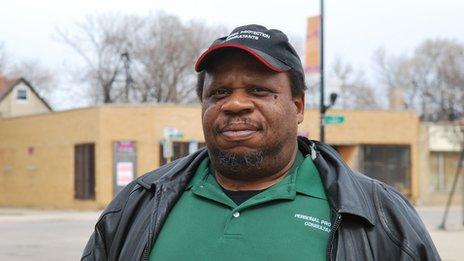
On the day of my visit, Gerald's students were all African-American but from a variety of backgrounds. They were reluctant to be photographed, but most were willing to talk.
One young social worker told me he wanted to protect the old people he accompanied in the street.
A middle class married couple had come because the husband had been shooting recreationally for years and his wife wanted to understand the appeal. She grasped it rather quickly, turning out to be an even better shot than him.
But did she think she would ever need to use her newfound skills? "Oh, no," she smiled, "I'm an optimistic person", before her husband reminded us that his brother had been shot in the back in a "good" Chicago neighbourhood a few years ago.
And then there was 75-year-old Mabel who lives alone with her younger twin sisters. She wants to be able to protect them if anyone breaks in and threatens their safety. She was an incongruous sight on the range, shaking with nerves and wearing a floppy straw hat, but she beamed with relief when Gerald told her that she'd passed the practical test.
"All of a sudden the little old lady with the cane, the old guy with the walker and the mother with the baby aren't such juicy victims for a criminal," Gerald said. "Because they don't know who's carrying a weapon"
Amar Kaleka lost his father in the 2012 Sikh temple shooting
Two hours' drive away, in Franksville, Wisconsin, I visited a different kind of firing range with a very different clientele.
In one of the wide open fields of the Winchester Gun Club, a line of people is poised to fire. Every couple of minutes, an orange skeet - or clay pigeon - whizzes through the air.
The man on the right shoots and misses several times before finally hitting his target and scattering skeet fragments to the four winds.
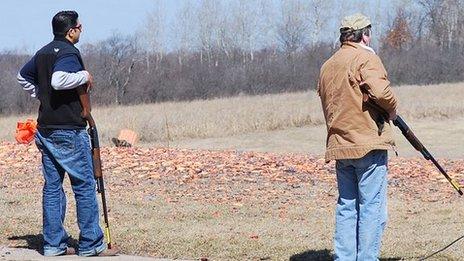
His name is Amar Kaleka, and he is running for the US Congress on a gun control ticket.
If he wins a Democratic Party primary contest in August, he will face the Republican Party's former vice presidential nominee, Paul Ryan, in November's mid-term elections.
Amar is both a gun owner and a victim of gun violence. His father, Satwant Singh Kaleka, was one of six people shot dead by a white supremacist at the Oak Creek Sikh Temple in August 2012.
Amar is a recreational shooter and stresses that he is not anti-gun.
"The gun is probably the most effective tool that man has ever made in terms of survival," he says. "So it's obvious that we need to have responsibility over it."
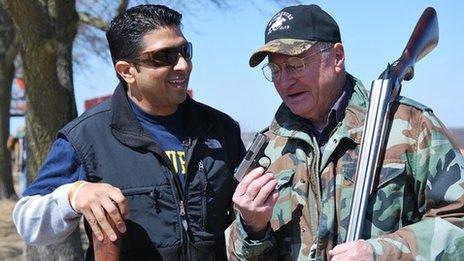
And so, as well as taking aim at the skeets, he engaged with some of the club's committed marksmen, trying to convince them that universal background checks on gun owners would save lives, not erode their Second Amendment rights.
Jim Fendry politely but emphatically disagreed. Dressed in a camouflage outfit, with a hunting rifle draped over his shoulder, Jim is president of the Wisconsin Pro-Gun Movement.
For him, the freedom to bear arms is one of America's main attractions, alongside its economic opportunities. Any attempt to restrict it - however well intentioned - would only harm the "good guys", not the criminals, he believes.
Nik Clark of Wisconsin Carry suggested that had Amar's father been armed, he might have survived the Sikh Temple attack.
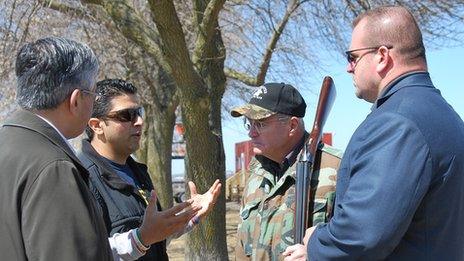
Inside the club house, they are rather less polite about the man they see as the real threat to their freedoms - President Obama.
Amar - who hopes to represent the president's party in Congress - thinks the US leader could have done more to keep guns away from dangerous people.
The gun club members think he's already done too much by even proposing universal background checks.
Two firing ranges. Two diverse sets of people handling weapons. What unites them is a sense that guns are - and will remain - an important part of American life.
- Published9 February 2014
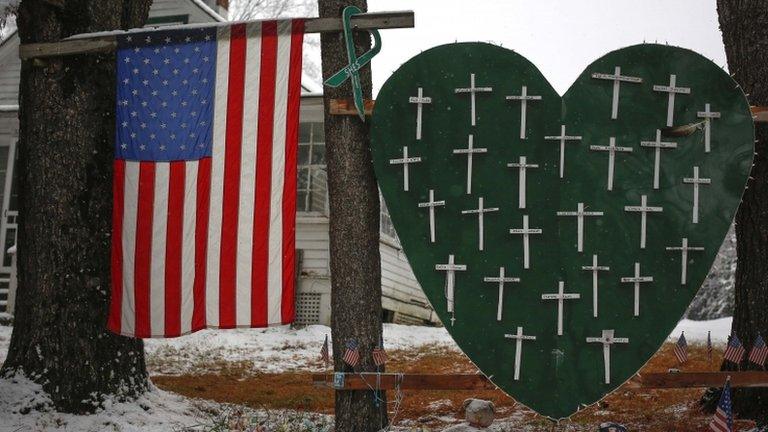
- Published12 December 2013
- Published17 September 2013